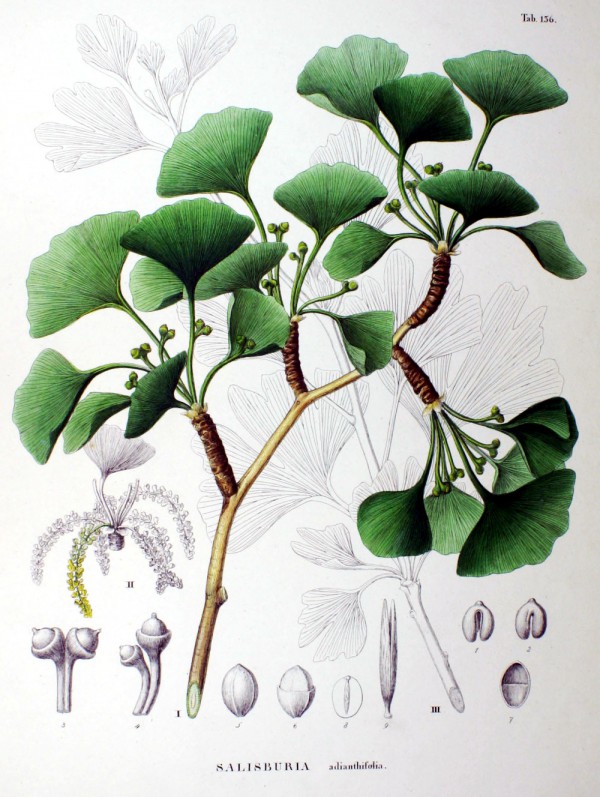Ginkgo biloba L. - syn. Salisburia adiantifolia Smith; Salisburia biloba (L.) Hoffmansegg. - Ginkgoaceae
银杏 yin xing (chin.), ginkgo, maidenhair tree, Ginkgo, Ginkgobaum, Elefantenohrbaum, Entenfussbaum, Mädchenhaarbaum
Dioecious tree, up to 40m high, native to China, Japan, Korea, widely cultivated as ornamental in Europe, North America; leaves pale green, turning bright yellow in autumn, unique formed, „… those on long branchlets divided by a deep, apical sinus into 2 lobes each further dissected, those on short branchlets with undulate distal and margin notched apex… Ginkgo biloba is now a rare species in the wild, but has been widely cultivated as an ornamental, probably for more than 3000 years. It provides shade and is tolerant of a wide range of climatic and edaphic conditions, including pollution. It is sacred to Buddhists and is often planted near temples. The wood is used in furniture making, the leaves are medicinal and used for pesticides, the roots are used as a cure for leucorrhea, the seeds are edible, and the bark yields tannin.“ http://www.efloras.org/florataxon.aspx?flora_id=2&taxon_id=200005235
„In the fall female trees produce yellow-orange fruits with a thick fleshy layer surrounding an edible kernel. The odor of these fruits is described as putrid. This study identified the odorous principles as high levels of butanoic and hexanoic acids.“
[Parliment, Thomas H. „Characterization of the putrid aroma compounds of Ginkgo biloba fruits.“ 1995. 276-279]
Fallen fruit-like seeds of female trees emit a very strong odor of butyric acid. But „…just touch once young Ginkgo leaves and you will experience the standard for a 'green leaf scent', which… is strongly dominated by the famous C6 lipid metabolites (Z)-hex-3-enal (14.0%), (Z)-hex-3-en-1-ol (54.5%), and (Z)-hex-3-en-1-yl (Z)-hex-3-enoate (0.3%)…“
[Scent of a vanishing flora, Roman Kaiser, 2011, 38-39 and 363]
Special standardised leaf extracts show effects like inhibition of acetylcholin esterase and platelet activating factor. They are used to treat the symptoms of various forms of cerebrovascular insufficiency and dementia like disturbed concentration and memory loss.
[Medicinal Plants of the World. Ben-Erik Van Wyk and Michael Wink, Pretoria 2004, 158]
In a randomized, double-blind, placebo-controlled clinical trial with 3069 volunteers aged 75 years or older, Ginkgo biloba at 120 mg twice a day was not effective in reducing either the overall incidence rate of dementia or Alzheimer disease (AD) incidence in elderly individuals with normal cognition or those with mild cognitive impairment (MCI).
[Ginkgo biloba for prevention of dementia: a randomized controlled trial., DeKosky, S.T., Williamson, J.D., Fitzpatrick, A.L., Kronmal, R.A., Ives, D.G., Saxton, J.A., Kuller, L.H., Jama, 300(19), 2009, 2253-2262] http://archinte.jamanetwork.com/data/Journals/JAMA/4440/joc80114_2253_2262.pdf
„Compared with placebo, the use of G biloba, 120 mg twice daily, did not result in less cognitive decline in older adults with normal cognition or with mild cognitive impairment.“
[Ginkgo biloba for preventing cognitive decline in older adults: a randomized trial., Snitz, B.E., O’Meara, E.S., Carlson, M.C., Arnold, A.M., Ives, D.G., Rapp, S.R., DeKosky, S.T., Jama, 302(24), 2009, 2663-2670]
Extracts of Ginkgo biloba leaves could be standardised to flavanoid (22-27%, mainly quercetin and kaempferol) and terpenic trilactones content (5-7%, including ginkgolides A,B,C 2.8-3.4% and bilabolid 2.6-3.2%). [DAB 2010]
A statistically significant advantage of Ginkgo biloba compared to placebo in improving cognition for patients with Alzheimer's disease, vascular or mixed dementia was shown. „Regarding activities of daily living, there was no significant difference for the whole dementia group. However, in the subgroup of patients with Alzheimer's disease, the advantage of Ginkgo biloba compared to placebo was statistically significant…
During intake of EGb 761®, mild gastro-intestinal symptoms, headache, dizziness or allergic skin reactions have occasionally been reported. Single cases of bleeding, e.g. intracranial haemorrhage, have been reported in the context of an intake of Ginkgo biloba preparations. However, some of these products concerned were of unknown origin and quality, some were multi-ingredient products, and in most instances anti-platelet agents or anticoagulants were taken in addition. A review of controlled studies indicated that the ginkgo extract EGb 761® does neither influence blood clotting nor bleeding time nor significantly potentiates the effects of anticoagulant or anti-platelet drugs.“
[Effects of Ginkgo biloba in dementia: systematic review and meta-analysis., Weinmann, S., Roll, S., Schwarzbach, C., Vauth, C., Willich, S.N., BMC geriatrics, 10(1), 2010, 14] http://www.biomedcentral.com/1471-2318/10/14
In the randomised, parallel-group, double-blind, placebo-controlled GuidAge clinical trial (5 years, 2854 participants), long-term use of standardised ginkgo biloba extract did not reduce the risk of progression to Alzheimer's disease compared with placebo.
[Long-term use of standardised Ginkgo biloba extract for the prevention of Alzheimer's disease (GuidAge): a randomised placebo-controlled trial., Vellas, B., Coley, N., Ousset, P.J., Berrut, G., Dartigues, J.F., Dubois, B., Touchon, J., The Lancet Neurology, 11(10), 2012, 851-859]

Ginkgo biloba L. as Salisburia adiantifolia Sm.; Siebold, P.F. von, Zuccarini, J.G., Flora Japonica, t.136 (1875)
http://plantgenera.org/species.php?id_species=465639
Ginkgo biloba
© Rolf Marschner (2008),
www.botanische-spaziergaenge.at
